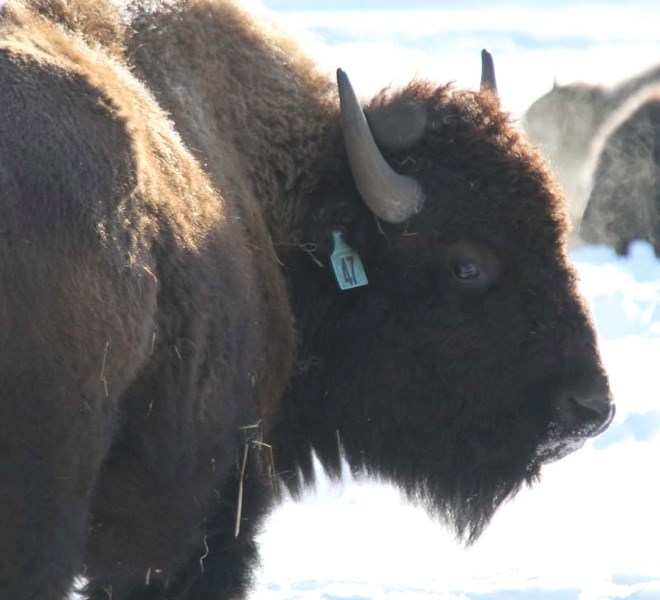With the wave of a hand, Bob Holm gestures at the miles and miles of fence he set up to mark the sloped hills and lush terrain of Straw Man Farm. Behind the wires and wooden poles, a herd of young bison graze on yellow grass and branches, their breath forming ghostly figures in the cold, January air.
It was two years ago that Holm, his three sons and business partners Paul Falkowski and Garet Bonn bought 500 acres of farmland about 50 kilometres north of St. Albert, and decided to raise bison.
They restored two old farm houses – now home to Holm’s sons – brought in 50 bison cows, and slowly built up their operation. In their first year, a few of the bison escaped and it took the boys almost a week to capture and return them to the farm, said Holm. But otherwise things have been going smoothly.
“We raise them with a gentle hand. Our calves, now that the boys have been with them since day one, they come right up to you and they are so calm,” he said.
Today Straw Man Farm is home to 180 bison, 120 chickens, 55 alpacas, six pigs and four goats. One day, they may invest in more land, said Holm, but they need to get their business going first.
To Holm, bison is the ultimate sustainable, natural and healthy food. The animals can survive extreme cold and stay outside in the winter. They live on grass, and their meat is low in fat and calories – almost better than salmon, he said.
That’s part of the reason why Straw Man Farm decided to raise bison. The proprietors want to educate consumers on buying food that caters to organic and healthy eating habits.
“There is nothing on our farm that is not natural,” said Holm. “We don’t give hormones, we don’t give steroids, we don’t give vaccines, we don’t give antibiotics. We don’t feed grain because it’s hard on the animals.”
Holm and Falkowski became business partners in the early 2000s while jointly running a building company called New Dimension Investments in St. Albert. They started selling all of their properties in 2007 – anticipating the market crash a year later, said Holm – and got out of the business by 2009.
Two years later they came up with the idea for Straw Man Farm and brought in long-term partner Bonn. Holm said they woke up to the health problems associated with genetically-modified and antibiotics-fed animals when one of his family members fell ill, and thus decided to make their own food.
Despite their backgrounds being in banking and sales (Holm worked for John Deere for 15 years), he said most of the experience they need comes from learning by doing.
“It’s not rocket science,” he said, adding that both his wife and Bonn have previous experience with farming.
“We are crazy city people trying to do farming,” added Falkowski. “By no means do we know everything. We just keep trying and we find the older, knowledgeable guys who’ve been doing bison farming for years and ask them for advice.”
For now the bison are still processed and butchered off-site but Holm said the partners are already working on an in-house butcher shop. The 2,000-square-foot room is now under construction beside one of their large storage barns (where they also plan to build a commercial kitchen and a year-round vegetable garden), and will be ready in a few weeks, he said.
“We have a butcher lined up,” he said. “It still gets processed in town because it has to be government inspected but then it can come to any butcher shop or our butcher shop.”
They also produce their own feed, a long, sprout-like grass that can grow indoors and is more sustainable and affordable than grain, he said.
In the long run, they hope to bring other, younger farmers on board to buy a parcel of their land, look after the chickens and pigs, and grow the operation. Not like a commune, laughed Holm, but with separate titles and shared costs.
“There are so many young people that want to get involved and that don’t have the money to get involved,” he said. “But this works for everybody and we need a team. There is no way we can do it all alone. It’s already too much.”
Where to get it
Bison meat from Straw Man Farm can be found at Grapevine Deli, or on the menu of San Remo Italian Bistro in St. Albert. The farm is also selling at the Morinville Farmers' Market on Friday. For more information visit strawmanfarm.com.




